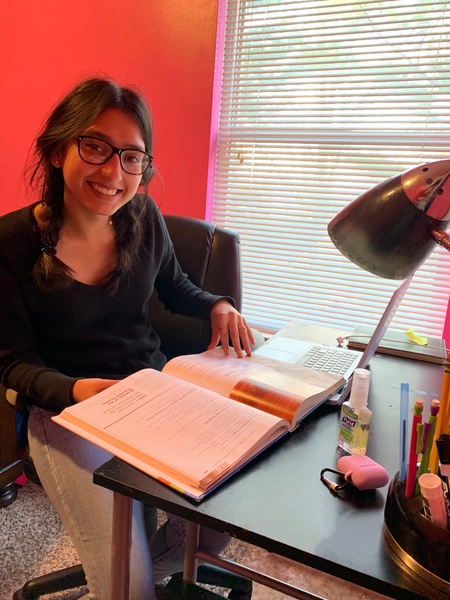Students, teachers adjust to school from home

Junior Lissy Duran works on anatomy in her room during days of nontraditional instruction.
April 3, 2020
With the spread of the Coronavirus taking over the country, many schools have switched to non-traditional instructional (NTI) days. These NTI days allow students to learn, work, and interact with their teachers from home.
Due to the Coronavirus, Boone is adapting to NTI learning, and Boone students are now experiencing how things can change very suddenly as they are forced to adapt.
The students have had mixed feelings; some feel as if these NTI days are bad and overwhelming, while others have enjoyed them and the new sense of freedom they give.
“It took a few days to get used to, but now I’m finding a good routine to follow,” junior Micheal Perkins said. “I enjoy how I get to decide the pace I work at. It’s also less stressful and more relaxing being able to do my work from home.”
But for some students, like senior Claudia Read, adapting to NTI has been more of a challenge.
“As a student, it’s put a lot of responsibility on me that I haven’t experienced yet,” Read said.
The change hasn’t only been for students though: teachers also had to adapt by converting everything to online and learning how to use new resources like Zoom, an online video-conferencing software.
“It has definitely been an adjustment,” said science teacher Lenny Beck. “Like most teachers, I am still finding new ways to reach students and help them learn.”
Converting lessons to online has been a challenge for teachers like Emily Brownstead.
“Converting a lot of my classroom activities into online assignments has been a struggle, so I’ve had to change a lot of my modern wars and AP classes,” Brownstead said.
Administrators and teachers are trying to make things work with no model to follow. The sudden shift from traditional classroom instruction to nearly total online learning has never happened before.
“We are all working really, really hard to make it work, but we are making it up as we go along and praying it’s good enough for our kids,” instructional coach Megan Steffen said.
As the instructional coach, Steffen’s been at the center helping teachers navigate the switch from the start.
“But one thing I’m hearing over and over from teachers: I miss my kids. And I miss them, too!” Steffen said.
Students are also feeling a lot of emotions about what they are missing.
“It’s extremely upsetting to have all your progress kind of wiped out. My choir and I spent three months putting really challenging pieces together, and for us to not get to perform it is a slap in the face,” Perkins said.
As crazy as all of these sudden changes seem, it’s important to remember why they’re happening.
“We are living history right now, and trying really hard to make things work when we have absolutely no model to follow,” Steffen said.


